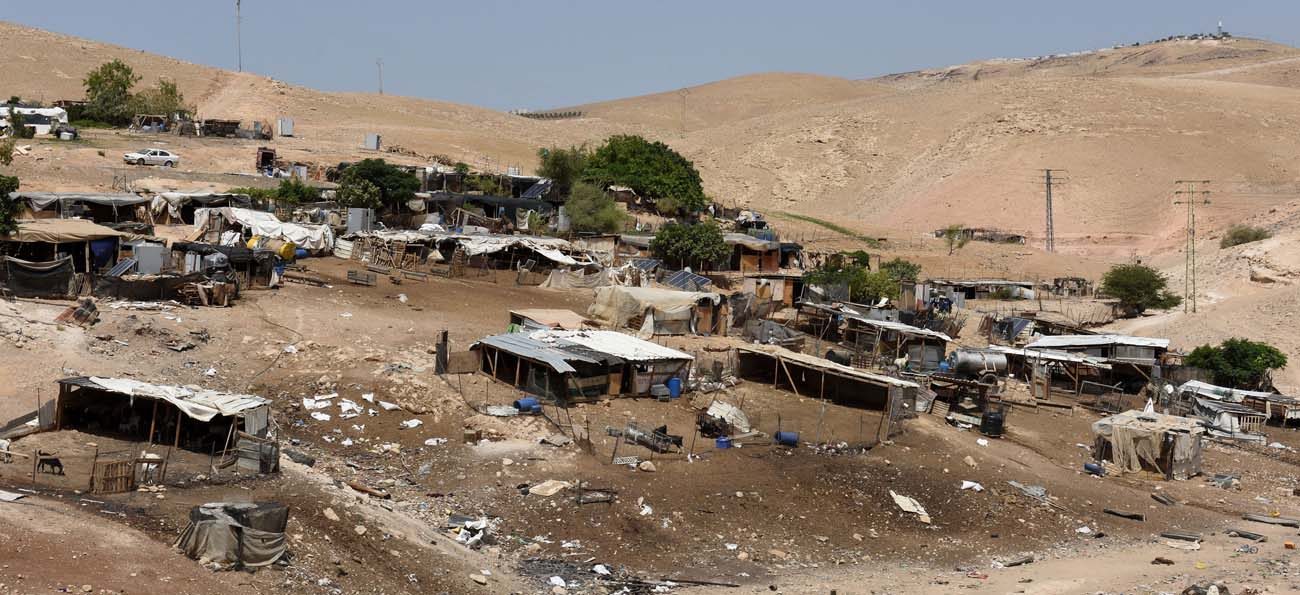KHAN AL-AHMAR, West Bank (CNS) — The white police vans that drove up to the crest of the hill overlooking this ramshackle Bedouin village could only spell trouble.
After decades of legal disputes, Israel’s Supreme Court ruled in May in favor of demolishing the village, home to about 190 people from the Jahalin Bedouin tribe and located between two Israeli settlements. The demolition of the tin and wood structures to clear the way for eventual expansion of the Mishur Adumim settlement could take place at any moment.
European Union leaders and religious and academic leaders from around the world have criticized the Israeli government’s decision to demolish the village and relocate its residents close to the al-Azaria Palestinian village, on the edge of a garbage dump.
[hotblock]
The Jahalin encampment has no electricity or running water, and the first to offer the community any kind of assistance were two Comboni sisters — Eritrean Sister Azizet Kidane and Italian Sister Agnes Elli, said tribe spokesman Eid Jahalin.
In 2008, the sisters began providing medical services for the children of the village. With Pax Christi International, they also raised funds for a project spearheaded by the Italian nongovernmental organization Vento di Terra to build the village’s first school. Built entirely from used tires, the school now also serves the surrounding communities and has a student body of 170 students up to the age of 14.
The sisters take the children to see the ocean and have helped some of the young girls to study courses outside of the village.
Now there is a sense of fear and uncertainty in the village, said Sister Kidane.
“They live in real suffering; they are living in a kind of suspension,” she said, noting that the residents are “worried and they don’t know what to do” about the imminent demolition.
“You feel hopelessness because you can’t do anything,” Sister Kidane said. “We are waiting the same way with them to see what will happen.”
The Jahalin say the land that the Israeli government wants them to move to is privately owned Palestinian land, and they do not want to move there.
[tower]
“Our parents lived here, we were born here, we grew up and married here, raised our children here and now we are grandparents here,” said Mohammed Jahalin, 50. He has been sitting in the traditional manner, on a mattress on the floor of an open-air communal hut with other male members of the tribe, fingering worry beads.
“The scent of our parents is here. Our memories are here. Whenever a car goes by now, our young children ask if they are coming to destroy our homes,” he said.
His children ask what will happen to their clothes and books, he said. They ask where they will go to school.
“A child says, ‘Father protect me,’ but I can’t protect my children when a bulldozer comes,” he said. “I try to calm my children and tell them that the whole world is with us and they won’t let it happen, but inside of me I know it will happen.”
Israel says the settlement was built without permission. The Bedouin say it is impossible to get a building permit from the Israelis.
Foreign and Israeli volunteers are taking turns staying in the village, so that, if the demolition happens, there will be people able to document it.
The tribe is resigned to the fact that they are pawns in the Israeli-Palestinian conflict, as well as part of the inevitable clash of traditional and modern urban cultures worldwide.
Another Jahalin band, located within the municipal limits of the Palestinian city of Jericho, is facing a demolition order by the Palestinian Authority, said Eid Jahalin. His sister and her family are among the 30 families affected.
The tribe is willing to adjust modern reality, he said, but want to be part of the decision-making process regarding their future.
The fear of losing their lifestyle is just as great as the fear of losing their homes. They worry their children will lose their connection with the desert and become connected to television and computer games, as they have seen happen to other Bedouin who have been relocated.
“Go to (the Israeli Bedouin town) Rahat, you will see the difference. I want my children to stay in the desert with a clean mind,” said Eid Jahalin. “It is important to save our way of life. We learn from the animals, from the desert. A house with windows and doors is a coffin for living people.”
Eid Jahalin’s daughter Iman, 14, and her friend Aya Jahalin, 17, pause to reflect on what could happen. “They can destroy the village, but we will stay here and sit here in the sun, like all Bedouin,” said Aya.
PREVIOUS: German bishops ignore pope’s request, resume Communion debate
NEXT: Pope accepts two more bishops’ resignations in Chile




Stop Israel period. They have usurped the Palestinian’s Homeland and the world just stands by and let’s them do it. The Christians and Muslims in the region have historical claims there, too.
STOP this persecution of this indigenous people!!!